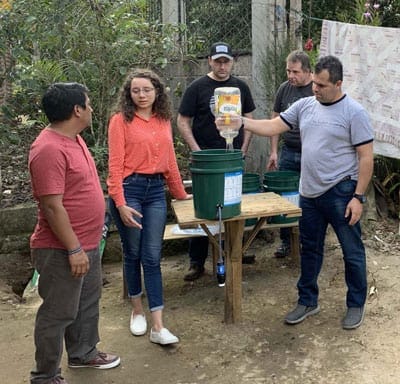
January 4, 2025 (Published: September 24, 2024)
As a coffee shop owner, you know coffee quality is key to keeping customers happy. But have you noticed more customers asking where your coffee comes from? Today’s specialty coffee drinkers care almost as much about sourcing as they do about taste.
At Crimson Cup, we ensure your coffee tells a compelling story of transparency, sustainability and giving back. Read on to learn how sourcing impacts your business and strengthens customer loyalty.
Coffee Sourcing Matters to Your Customers
Today’s coffee consumers want their purchases to make a difference. They value fair labor, sustainable farming, and social responsibility. In short, they prefer coffee that tastes great and does good.
Research from Columbia University shows that coffee sourcing shapes buying decisions. Many prefer certified options like Fair Trade and Rainforest Alliance, which help to ensure fair wages, environmental protection and community support.
Studies also show consumers are willing to pay more for sustainably sourced coffee. Brands that prioritize economic sustainability appeal strongly to these conscious buyers.
Sustainable Coffee Sourcing at Crimson Cup
At Crimson Cup, sustainability drives every part of our value chain – from responsible sourcing to collaborative global relationships. Our efforts focus on three pillars: social, environmental and economic sustainability.
Social Impact: FocusOnGood™
“We create positive change through our products and relationships around the world that inspire you to help us make a meaningful impact with every cup we pour.”
Giving back has been a Crimson Cup core value since our founding in 1991. We give back to make a positive impact in local and global communities.
In coffee-growing regions, we provide books, computers, educational tools and clean water systems. We also take coffee shop customers to these communities for hands-on projects like building homes for coffee pickers.
By serving Crimson Cup coffee, you share a story of empowerment. With every cup, your customers help fund clean water, education and vital resources for coffee-growing communities.
Environmental Stewardship: Reducing Our Footprint
Crimson Cup leads in responsible sourcing and environmental initiatives. From waste audits and recycling to innovative composting, we’re committed to reducing coffee’s environmental impact.
Our Director of Sustainability, Brandon Bir, regularly lectures on mitigating waste and moving toward zero waste. We’re shrinking our carbon footprint by repurposing coffee by-products, recycling packaging and optimizing shipping processes.
“From our waste streams to the way we move product, environmental and social sustainability challenges and opportunities change often, and we must be adaptive.” Bir said. “We are constantly looking at more sustainable solutions for every facet of our business.”
Economic Sustainability: Supporting Farmers
Coffee-growing communities face numerous economic challenges. At Crimson Cup, we help communities overcome market challenges by sharing best practices, connecting farmers with agronomy experts and funding coffee-processing experiments. These efforts improve crop quality, allowing farmers to earn higher prices.
We also help farmers set up quality control labs, equipping them to make better decisions and increase their selling power. By serving Crimson Cup, you offer more than great coffee – you support thriving communities and long-term relationships your customers will value.
Everyone participates in our values with the purchase of a cup or bag of coffee.” Bir explains, “We wouldn’t be able to complete projects or lessen information asymmetry without the support from our customers. It’s absolutely a domino effect – the purchases directly impact growing communities and goodwill projects around the world.”
Friend2Farmer®: Empowering Communities through Direct Trade
Our Friend2Farmer® program goes beyond Fair Trade, building direct, long-term relationships with farmers. We purchase coffee directly from farmers or cooperatives, hand-roast it ourselves and help fund community projects like building homes and clean water systems.
With Friend2Farmer®, you serve coffee that supports sustainable communities while creating a more equitable supply chain.
Challenges in the Coffee Supply Chain
The coffee supply chain faces growing challenges, from climate change to market instability. Rising temperatures and unpredictable weather affect crop yields, forcing farmers to adapt.
Meanwhile, consumers demand more transparency and responsible sourcing.
Rising costs and inflation in producing countries and the U.S. make it harder for farmers and coffee shop owners to forecast prices.
Single-use products, which surged during the pandemic, add to this pressure as shops attempt to balance sustainability with convenience and cost.
Market stability is another issue. Coffee prices swing between highs and lows, forcing producers to hold onto their crops longer in hopes of better prices. This volatility strains the entire supply chain, from farm to cup.
Collaboration between farmers, suppliers, roasters and coffee shops is key to addressing these challenges and ensuring a stable, transparent and sustainable coffee supply chain.
Why Transparency in Coffee Sourcing Matters to Your Business
Transparency is no longer optional for specialty coffee shops. Coffee customers want more than just a great cup – they want to feel good about their choices. That includes knowing where their coffee comes from and how it’s sourced.
By serving Crimson Cup, you align your shop with a brand that values transparency as much as your customers do. You also give customers reasons to return and to spread the word about your shop.
With Crimson Cup’s ethical and sustainable sourcing, you can provide the transparency your customers crave. Together, we can make a meaningful impact – one cup at a time.
Source link
